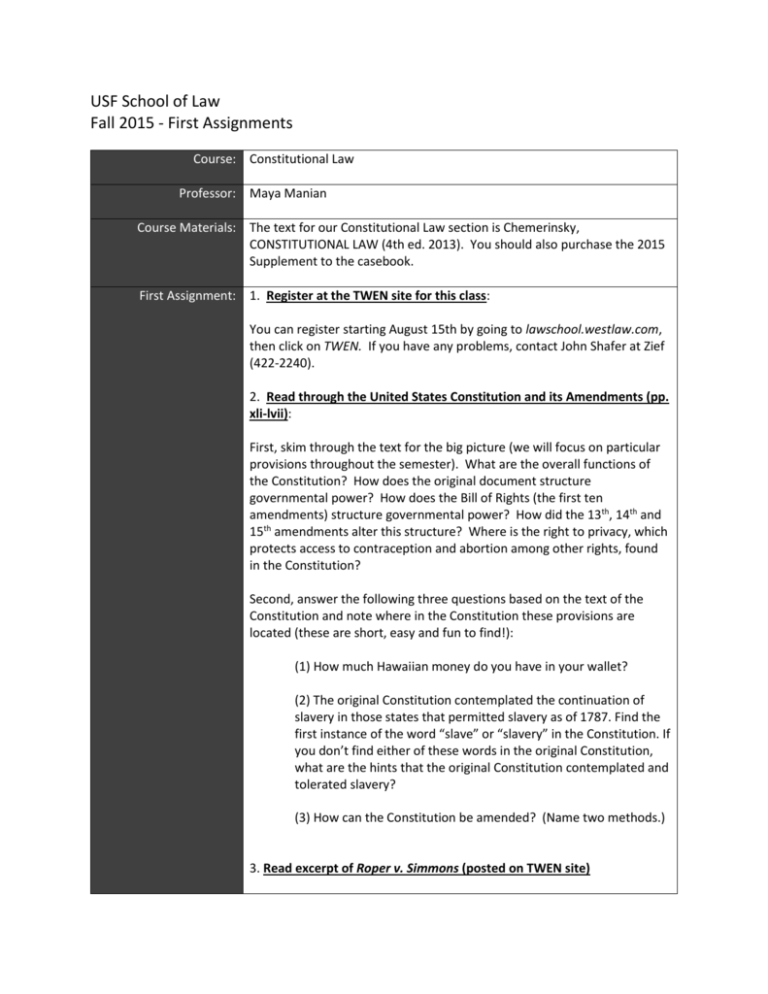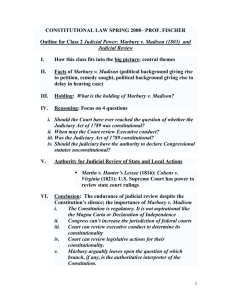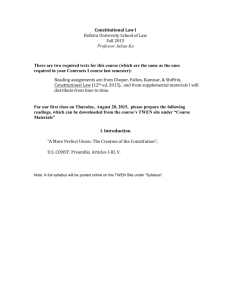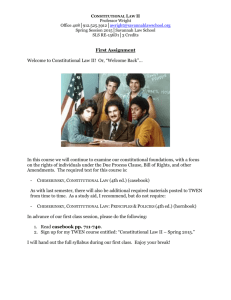USF School of Law Fall 2015 - First Assignments Course
advertisement

USF School of Law Fall 2015 - First Assignments Course: Constitutional Law Professor: Maya Manian Course Materials: The text for our Constitutional Law section is Chemerinsky, CONSTITUTIONAL LAW (4th ed. 2013). You should also purchase the 2015 Supplement to the casebook. First Assignment: 1. Register at the TWEN site for this class: You can register starting August 15th by going to lawschool.westlaw.com, then click on TWEN. If you have any problems, contact John Shafer at Zief (422-2240). 2. Read through the United States Constitution and its Amendments (pp. xli-lvii): First, skim through the text for the big picture (we will focus on particular provisions throughout the semester). What are the overall functions of the Constitution? How does the original document structure governmental power? How does the Bill of Rights (the first ten amendments) structure governmental power? How did the 13th, 14th and 15th amendments alter this structure? Where is the right to privacy, which protects access to contraception and abortion among other rights, found in the Constitution? Second, answer the following three questions based on the text of the Constitution and note where in the Constitution these provisions are located (these are short, easy and fun to find!): (1) How much Hawaiian money do you have in your wallet? (2) The original Constitution contemplated the continuation of slavery in those states that permitted slavery as of 1787. Find the first instance of the word “slave” or “slavery” in the Constitution. If you don’t find either of these words in the original Constitution, what are the hints that the original Constitution contemplated and tolerated slavery? (3) How can the Constitution be amended? (Name two methods.) 3. Read excerpt of Roper v. Simmons (posted on TWEN site) Roper held that imposing the death penalty on juveniles violates the 8th Amendment. Although the death penalty is not traditionally studied in Constitutional Law courses, this case raises important themes that reverberate throughout constitutional law. When should the Supreme Court reverse its prior decisions versus adhering to the principle of stare decisis? What are the best methods for constitutional interpretation? Why is it appropriate for unelected judges to overturn the democratic will expressed by the political branches? Finally, what if any influence should international law have on our domestic constitutional law? We will briefly discuss these themes before moving on to Marbury v. Madison. 4. Read pp. 1-11 of the casebook (Marbury v. Madison and note following case): Marbury v. Madison is the foundational case for constitutional law so we will be taking a close look at Chief Justice Marshall’s reasoning. Why do you think Marbury, which is two centuries old, is still cited as the most important case in constitutional law? What exactly does Marbury hold? Do you think it is well reasoned at each step? Since the opinion is written in arcane language and may seem difficult to parse through at first, I recommend that you brief this case, outlining its ultimate holdings and key points of analysis. Additional Notes: Seats will be assigned at the first class. This is a fascinating time to study constitutional law. The Supreme Court’s recent decisions on campaign finance, healthcare reform, and same sex marriage signal huge shifts in the law. The Roberts Court is clearly aiming at more significant changes in the landscape of the law to come, including a decision on affirmative action in higher education scheduled to be heard this term. I’m looking forward to the class and to meeting all of you on the 24th! MM







